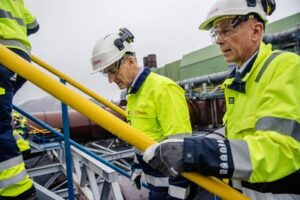Elkem takes 100 percent ownership of Salten energy recovery plant
Oslo, Norway – Elkem has secured 100% ownership of the Elkem Salten energy recovery plant, after acquiring the remaining 50% stake from Kvitebjørn Energi. The transaction is attractive to Elkem and provides increased strategic flexibility.
On 15 November, Prime Minister Jonas Gahr Støre opened the new energy recovery plant at Elkem Salten in the northern part of Norway. The energy recovery plant is closely integrated with the silicon production process at Elkem Salten, utilizing the excess heat from the silicon furnaces to produce electrical power. The plant recovers 28% of the electrical energy used at Elkem Salten, equal to the power consumption of about 15,000 Norwegian households.
The energy recovery plant has been built in partnership between Elkem and Kvitebjørn Energi, each holding a 50% stake. The total investment has amounted to around NOK 1.2 billion, financed through a NOK 350 million grant from Enova, significant external debt and some equity. The parties have agreed to keep the purchase price for the 50% stake confidential.
“Elkem aims to be part of the solution to combat climate change – and to be one of the winners in the green transition. The new energy recovery plant at Elkem Salten, developed together with our partners in Kvitebjørn Energi and with financial support from Enova, further strengthens our efforts to ensure environmentally friendly silicon and ferrosilicon production with the lowest possible emissions and lowest possible use of resources,” says Elkem’s CEO, Helge Aasen.
“With today’s acquisition, we position Elkem for financially attractive returns and increased strategic flexibility, while at the same time delivering on our climate roadmap. Elkem has now established a strong portfolio of energy recovery plants across several of our locations. We believe that energy recovery will be a key pillar in the green transition, and we see significant additional potential for additional energy recovery in our industry with the right support mechanisms,” says Aasen.

